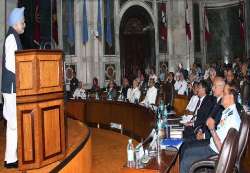ID :
260161
Sat, 10/20/2012 - 10:27
Auther :
Shortlink :
http://m.oananews.org//node/260161
The shortlink copeid
Cyber World And Space, Sources Of New Threats: India

New Delhi, Oct 20, IRNA - Prime Minister of India Manmohan Singh criticized Friday the cyber world and cyber space calling them as sources of new threats.
Addressing top commanders of Army, Air Force and Navy in New Delhi, he said that the threats could be met by reorienting "mindsets."
India's security challenges remain "diverse and serious" in the form of cross-border terrorism, transnational crime and drug trafficking, added the Prime Minister.
He said, "Added to these are new challenges in areas that constitute the 'global commons' -- such as space, the high seas and cyber space."
Singh also talked about the need to protect "new found equities" like securing the sea lanes for energy security.
Underlining that "comprehensive responses" were required to meet "growing complexities", the Inidan Prime Minister said, "We should aim to abandon single service or segmented approaches and develop synergies across services.
Compartmentalized views will only delay our response and dilute its impact."
He particularly stressed the need for increasing capabilities in "emerging areas like cyber and space, which can be the sources of new threats" and said, "We must therefore reorient our mindsets and define a long-term integrated perspective that aligns these capabilities with envisaged outcomes."
Noting that security would remain a "pre-eminent and key pillar" of national strength, the Prime Minister said the services would have to equip themselves to meet the evolving challenges.
According to Singh, addressing the challenges would require addressing issues of jointness and skills, of training, doctrines and strategies, and of integrated decision-making structures and weaponry.
All of those needed to be supported by indigenous research and production capabilities, the Prime Minister said, adding, "These issues require constructive debate, not just about our strategic options, but also on our need to develop composite capabilities."
As for India's neighborhood, he said it remains "complex with elements of instability" in the political arena and the geo-strategic environment comes with its own "conventional, strategic and non-conventional" security challenges.
"All around us, we see a churning of the political, economic and social systems of various countries with uncertain outcomes," Singh said without naming any nation.
"We cannot hope to develop and grow peacefully while our immediate neighbors struggle with poverty, strife and under-development," he said.
He maintained that India has been a strong proponent of efforts to promote international peace, security and development and to act as a factor of stability in the region and beyond.
Observing that India's external policies would emphasize friendly and cooperative ties with its neighbors, Singh said focus would be on establishing greater connectivity in South Asia and expanded neighborhood to promote the movement of goods, services, investment and technology "so that we can act as a motor of growth in this region".
Describing the Services as "an inalienable arm of our diplomatic approach", Singh said he expected them to play a "full and effective role" in this national endeavor.
He said India's strategic calculus encompasses areas from the Gulf of Aden to Straits of Malacca and "very recently, we have seen precisely these areas turn once again into fresh theaters of contestation.
"We have consistently maintained that all issues must be resolved peacefully through dialogue. Wherever feasible, multilateral and international organizations such as the IAEA and the United Nations must be allowed to play their due role."
On the procurement of equipment for the armed forces, he said, "Our acquisition processes and procedures must stay abreast of global best practices./end





